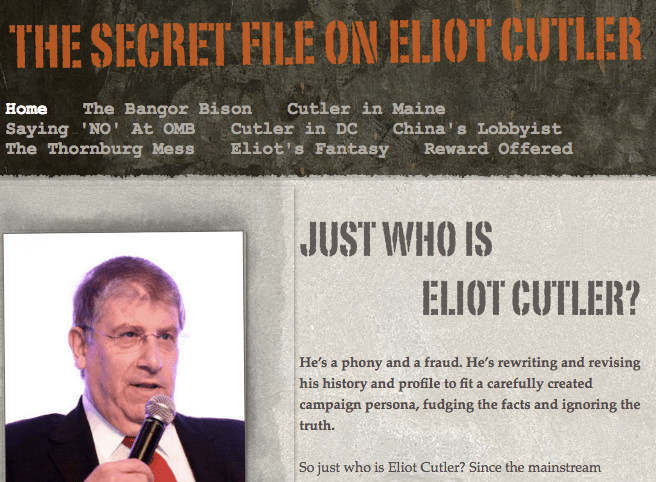PORTLAND – The question of whether an anonymous website critical of Eliot Cutler during the 2010 gubernatorial race was the work of a “citizen journalist” protected by the First Amendment or a kind of campaign flier put out by a political operative was argued before a federal judge Friday.
The dispute concerns a now-defunct website called the Cutler Files. Its creators claim that information posted on the site deserved the same protections as anonymous political speech. The state asserts that anonymity violated the public’s right to know who is trying to influence elections.
The legal battle involves a number of high-profile players in the 2010 election: political consultant Dennis Bailey, whose legal team includes the ACLU of Maine Foundation; Rosa Scarcelli, the Democrat who lost her bid for her party’s nomination; and Cutler, an independent who narrowly lost to Gov. Paul LePage in the general election.
The state ethics commission began investigating the Cutler Files website after Cutler filed a complaint. The commission fined Bailey $200 for failing to identify himself as the person who paid for the website. Bailey filed a suit against the ethics panel that claimed he had a constitutional right to publish the Cutler Files anonymously.
The Cutler Files website was active in 2010 from about Aug. 30 through the election on Nov. 2. Bailey had been working for Scarcelli before she lost the June primary and then went to work for independent candidate Shawn Moody.
On Friday in U.S. District Court, Zachary Heiden argued on Bailey’s behalf that protection of anonymous speech about candidates for office lies at the heart of the First Amendment and is part of a long tradition. The hearing was on both parties’ motions for summary judgment.
“The fact that someone has a day job in politics doesn’t mean they give up their First Amendment rights,” said Heiden, legal director of the ACLU of Maine.
Heiden noted that broadcast stations, newspapers, magazines and other publications are exempt from rules about political expenditures, and therefore, from disclosure rules. He argued that the rules have not kept up with the realities of new media even though that is where most people now exchange information and get their ideas.
But Assistant Attorney General Phyllis Gardiner, who represented the ethics commission, said the case is not about citizen journalism or the Internet, but about providing the public with information so it can evaluate the credibility of a political message.
“The commission found Mr. Bailey put the Cutler Files website on the Internet, clearly advocating against Eliot Cutler in the few weeks leading up to the election. And that’s exactly the kind of communication that requires simple attribution (about) who is speaking,” she said.
According to Gardiner, the press exemption didn’t apply to the Cutler Files for a simple reason: it was not a periodical. That category can only apply when there’s some level of periodic updating or publishing, even if the time periods aren’t regular, she said.
District Judge Nancy Torresen peppered Heiden, Gardiner and Melissa Hewey, a lawyer for Cutler, with questions about case law and their interpretations of campaign finance law. Torresen did not indicate when she would issue her decision.
Neither Bailey nor Cutler, an intervenor in the case, attended the hearing. Scarcelli and her husband, Thomas Rhoads, who is considered an interested party in the case, were not present either.
Documents filed in the case earlier this year indicate that Scarcelli and her team conducted opposition research on Cutler in 2009 to present to the Democratic Governors Association and that Scarcelli mentioned a blog campaign about Cutler in an email.
Rhoads began assembling information on Cutler, some from Internet research and also by purchasing Democratic voting records that showed Cutler and his wife had voted by absentee ballot while claiming to live in Maine, according to the documents.
After losing the primary, Scarcelli offered the research to the Democratic candidate, Libby Mitchell, for $30,000, according to Scarcelli’s deposition testimony. Mitchell turned down the offer.
Rhoads and Bailey later discussed creating an anonymous website.
Bailey spent $91.38 on the Cutler Files website.
Bailey wanted to be anonymous so the material would be judged on its on merits and also because he feared retaliation, according to a brief filed by his defense team.
Bailey disclosed his role in the website in December 2010. Rhoads admitted his involvement in January 2011, months after media reports about his participation.
Staff Writer Ann S. Kim can be contacted at 791-6383 or at:
akim@pressherald.com
Twitter: AnnKimPPH
Copy the Story Link
Send questions/comments to the editors.



Success. Please wait for the page to reload. If the page does not reload within 5 seconds, please refresh the page.
Enter your email and password to access comments.
Hi, to comment on stories you must . This profile is in addition to your subscription and website login.
Already have a commenting profile? .
Invalid username/password.
Please check your email to confirm and complete your registration.
Only subscribers are eligible to post comments. Please subscribe or login first for digital access. Here’s why.
Use the form below to reset your password. When you've submitted your account email, we will send an email with a reset code.